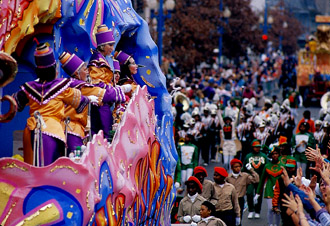Mardi Gras a great investment, Tulane study says
Small wonder that gold is one of Carnival's primary colors. Mardi Gras 2011 contributed more than $300 million to the New Orleans economy and provided the city nearly $8.50 in tax revenue for every dollar it spent on overtime for police, fire and sanitation workers, according to a new study by Toni Weiss, professor of practice in economics at Tulane.

The Carnival season has a significant impact on the New Orleans' economy, says economist Toni Weiss, who studied the topic for the Carnival Krewe Civic Foundation.
Mardi Gras 2011 represented slightly more than 1.5 percent of the city's gross domestic product when direct expenditures and a “brand value” are added to the calculations, Weiss said.
“Every tax dollar generated as a result of Mardi Gras generates a greater return on the city's investment,” she added.
Weiss, who conducted the study on behalf of the Carnival Krewe Civic Foundation, examined Mardi Gras spending in the city of New Orleans exclusively, and limited her calculations to actual expenditures made by out-of-town visitors, local citizens, Carnival krewe officials, krewe members and city government.
An earlier study of the 2009 Mardi Gras celebration concluded that the '09 Carnival had a slightly higher economic impact, due mainly to the impact the national economy had on tourist expenditures in 2011.
“Hotel room revenue, while achieving enviable occupancy rates, was down 5 percent from 2009 due to a decrease in average room rates of 7 percent. While this reduction in lodging expenditures was too great to overcome increases in local spending, the good news is that the overall decline in direct economic impact was minimal,” said Weiss. “Additionally, once tourist dollars rebound there is every reason to believe that future Mardi Gras seasons will be stronger than ever.”
